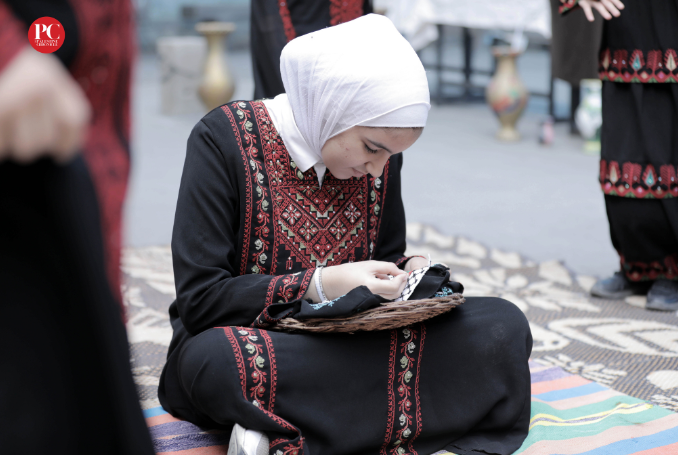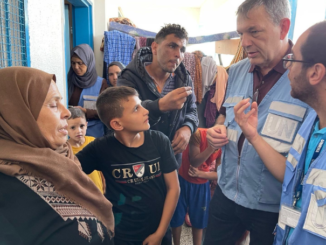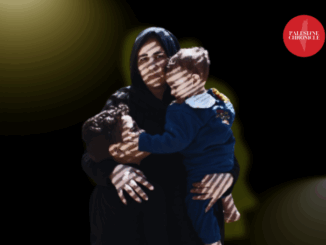
By Benay Blend
While Palestinians are undergoing genocide, it seems incongruous to write about the region’s cuisine. Nevertheless, by way of passing down recipes to the next generation, Palestinians have maintained their foodways through acts of resilience and resistance.
Yasmin Khan, author of The Saffron Tales, tells of interviewing Essa Grayeb, a Palestinian rheumatology nurse, in East Jerusalem. The area might be very charming for tourists, Grayeb explains, but because of the occupation, it is an extremely hard place to live.
Upon hearing that Khan was writing about food culture in the region, she warned: “We are not clowns in a circus for you to come and watch and make research notes about and then make your name from writing down our suffering.”
Her comment sounds like a riff on the late Ghassan Kanafani’s reply to a Danish journalist who asked if he could help her visit the Beirut camps. “My people are not animals in a zoo,” Kanafani said to Anni, who two months later would become his wife. “You must have a good background about them before you go and visit.”
As a writer of fiction, Kanafani believed that cultural resistance intersected with other forms of revolutionary actions. In this way, nonviolent resistance such as the Boycott, Divestment and Sanctions movement and armed resistance are not paired in an either/or relationship, but rather travel along similar paths towards the goal of liberation.
As of February 24, 2024, The Palestinian Ministry of Culture reported that 207 archeological sites and buildings of cultural and historical significance, out of a total of 320, have been destroyed by US-funded “Israeli” bombs. Though the “Israeli” military has destroyed even more mosques, universities, and historic landmarks since that date, Palestinians continue to preserve their culture, including foodways.
As the entity continues to reduce material culture to rubble, it becomes increasingly important to uphold the nonmaterial realm, including foodways and poetry, and sometimes the two together. This article navigates through related polarities—the beauty of Palestinian cooking as replayed in literary form along with ways that food represents the sorrows of a people who are struggling for justice and the right of return.
Palestinian society at home or diasporic has essentially been a tragic one. Its poetry has mirrored this experience, yet there is also a sense of resilience and sumud (steadfastness) that transcends tragedy to present a heroic vision of resistance, hope, and pride of heritage, including traditional cuisine which links them to the land.
“There is no self-pity either in the personal or collective sense,” explains poet, writer, translator, and anthologist Salma Khadra Jayyusi, “for this would vitiate the nobility and justice of the struggle” (Anthology of Modern Palestinian Literature, 1992, p.62). Moreover, it would imply “cringing before the uncompromising responsibility of resisting injustice” (p. 62).
At once rejecting her situation by affirming ongoing Palestinian connection to the land while acknowledging the political reality of displacement, Lala ‘Alush presents life in occupied Palestine as representing profound loss tempered by assurance of regaining what was lost. In “The Path of Affection,” ‘Allush recounts a road trip she took from Jerusalem to Haifa in order to visit relatives.
On the minibus, she found herself the only Palestinian, the lone “authentic, well-rooted” face among faces that she considered “alien” (Anthology of Modern Palestinian Literature, p. 106), her fellow travelers who knew “nothing of [her] suffering” (Anthology of Modern Palestinian Literature, p. 106).
Nevertheless, the land remained the same despite industrial ways of farming, “huge trucks and foreign tractors” (p. 106). Each orange grove belonging to her ancestors recognized her as kin, leaving her with the assurance that the land and all that grew on it remained Arabic despite the many years of occupation.
While ‘Allush writes of her life as a second-class citizen, Fawaz Turki’s prose accounts and poetry stems from his experience as a Palestinian in exile from his country. In “The Seed Keepers,” he expands on ‘Allush’s notion that the kernel of Palestinian culture will never be destroyed.
While he acknowledges the grim reality of life under occupation, where dreams are burned along with the land, valleys are flattened by bomb, and the past is erased by Zionists eager to replace it with another story, Turki warns that he “guard[s] one seed of a tree” (Anthology of Modern Palestinian Literature, p. 363) planted by his ancestors and he plans to replant it once liberation has occurred.
No cuisine is present here but rather what can be assumed is the seed of an olive tree that signifies existence is resistance for Palestinians.
In These Olive Trees: A Palestinian Family’s Story (2023), Aya Ghannameh explains that “today, the olive tree is a symbol of Palestinian resistance, longevity, and identity” (p. 31). It attests to the sumud of Palestinian existence that their relationship to cuisine is sustained by their connection to the land, a relationship that is maintained even when the people are forced to move.
In Mohammed El-Kurd’s homage to his grandmother Rifka (2021), the poet/journalist writes of “Bulldozers Undoing God,” “constant Nakbas,” (p. 11) that are so normalized that they assume a seat at the Palestinian table. “Tragedy” and “teargas” turn breakfast into “mornings of mourning” (p. 11), where iconic foods such as olives, za’atar (wild thyme), tomatoes and cucumber coexist with the sound of bulldozers demolishing a nearby home. In his witnessing of catastrophe over the years, El-Kurd transforms suffering into sumud as certain items, including za’taar, that signify survival under harsh conditions, remain part of the Palestinian meal.
In a 1921 interview with George Abraham of Mondoweiss, El-Kurd spoke about the writing of this first book in words that resonate today. Refusing to “hyper focus” on Palestinians as victims in his poems, he says that not only does that flatten the characters, but it also implies that negotiation is impossible with people holding a gun.
“So when we send our children to Congress to go talk to congresspeople and make the case for our humanity while Congress is sending almost $4 billion to the Israeli occupation annually, you understand that these people,” El-Kurd concludes, “I don’t think conscience is a solution we should be looking to, because they don’t have it.”
On the other hand, El-Kurd believes that poetry has become a tool of the resistance because it allows the writer to express “political convictions in a way that you’re not allowed to institutionally, and to simplify theories and introduce people to new visions and rounds of perspectives that you would not be able to do traditionally,” thereby reaching more people than a political speaker would be able to do.
In the introduction to Gaza Unsilenced (2015), poet/journalist Refaat Alareer, who was martyred on December 6, 2023, in an “Israeli” airstrike on his home in Gaza, provided an analysis along similar lines. “Despite or personal losses in this ongoing ethnocide,” he wrote of the 2014 siege, “we have been careful to avoid portraying Palestinians in Gaza as passive victims to be pities, starving, impoverished, silenced into submission” (p. 19).
Alareer’s words proved to be prophetic, as he was martyred during the entity’s latest round of genocide, but his legacy lives on through the work of his students and friends, illustrating his belief that it is impossible to kill a story such as his.
Like za’taar that survives under the harshest conditions, Alareer’s poem “If I Must Die” will continue to sustain readers for generations to come.

– Benay Blend earned her doctorate in American Studies from the University of New Mexico. Her scholarly works include Douglas Vakoch and Sam Mickey, Eds. (2017), “’Neither Homeland Nor Exile are Words’: ‘Situated Knowledge’ in the Works of Palestinian and Native American Writers”. She contributed this article to The Palestine Chronicle.







